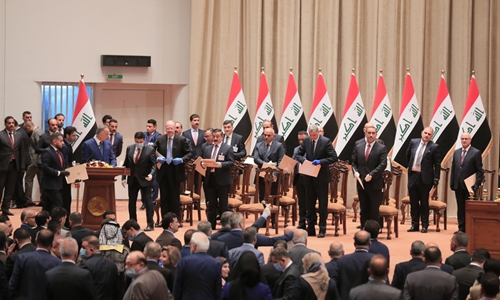New Iraqi government to fix fiscal mess
Source:AFP Published: 2020/5/7 15:43:40
Premier Mustafa Kadhemi took office in Iraq facing domestic crises

Iraqi Prime Minister Mustafa Kadhemi (at podium in blue) and his government in front of other members of the parliament during an overnight session in Iraqi capital Baghdad on Thursday Photo: AFP
Mustafa Kadhemi took office as Iraqi premier early Thursday after breaking months of political deadlock, taking the reins amid a staggering economic crisis, a health pandemic and the specter of renewed protests.
Observing social distancing to curb the spread of coronavirus, lawmakers gathered at parliament in masks and gloves around 9 pm local time, but the vote was delayed for hours to make last-minute edits to ministerial posts.
Kadhemi soon received a congratulatory call from US Secretary of State Mike Pompeo, who announced a 120-day waiver extension on US sanctions to let Iraq buy gas from neighboring Iran.
The waiver is "a display of our desire to help provide the right conditions for success," the State Department said.
Kadhemi's nomination came after weeks of lobbying deeply divided political parties, including those close to neighboring Iran who had been wary of his ties to the US.
One hard-line faction had accused Kadhemi of conspiring with Washington over the January drone strike that killed Iranian general Qasem Soleimani and Iraqi commander Abu Mahdi al-Muhandis outside Baghdad airport.
MPs approved 15 ministers out of a prospective 22-seat cabinet, with seven ministries still empty as political parties squabble over shares.
Kadhemi, the 53-year-old former head of the respected National Intelligence Service (INIS), was nominated by President Barham Saleh on April 9 - the third attempt to replace outgoing premier Adel Abdel Mahdi.
Abdel Mahdi, 77, resigned in late 2019 following months of protests decrying rampant corruption, unemployment and a political class seen as beholden to neighboring Iran.
He became the first premier to step down since the 2003 US-led invasion that toppled dictator Saddam Hussein, but stayed on as caretaker PM in the absence of a successor.
The new PM appeared to have brought Iran-aligned factions on board, with endorsements from both Soleimani's successor as Quds Force chief Ismail Qaani, and from Mohammed Kawtharani, the pointman on Iraqi affairs for powerful Iran-backed Lebanese movement Hezbollah.
The ministers who were approved included those for the sensitive portfolios of finance, interior, defense, health and electricity - securing the majority that Kadhemi needed for his cabinet to be considered viable.
The new body is meant to hold early elections seen as an opportunity for a political reset for the country, but it will also face urgent policy priorities.
Iraq's GDP is set to shrink by 9.7 percent in 2020 and poverty rates may double, making it the country's worst annual performance since 2003, the World Bank has warned.
The enormous deficit brought on by collapsing crude prices may force the cabinet to trim salaries for state workers, potentially sparking new anti-government rallies.
AFP
Posted in: MID-EAST,WORLD FOCUS,EYE ON WORLD